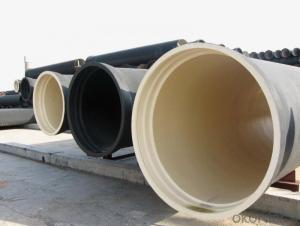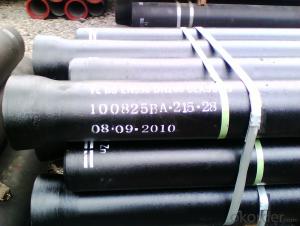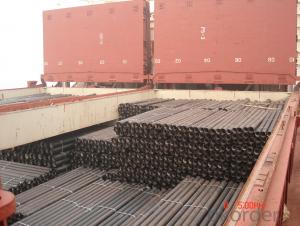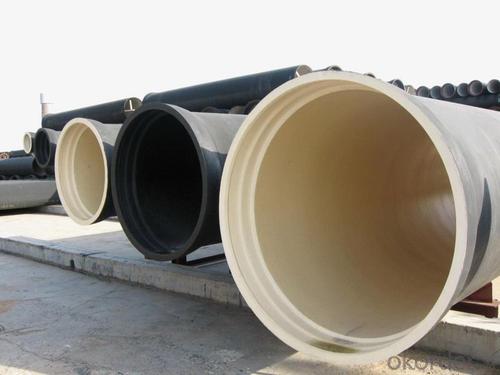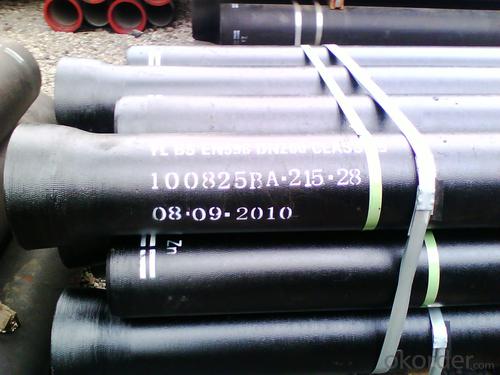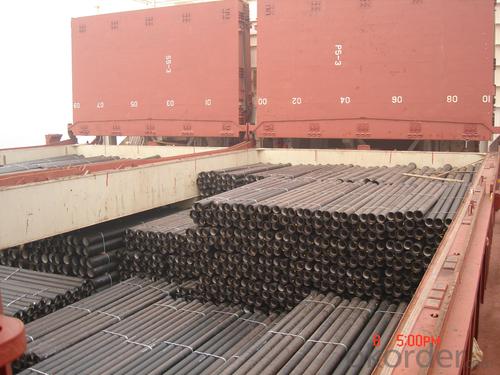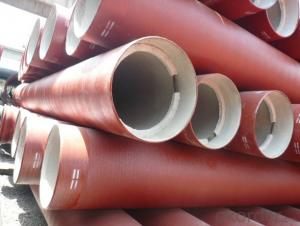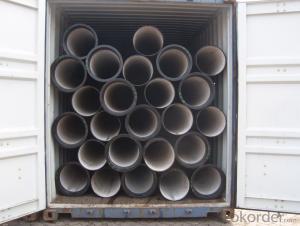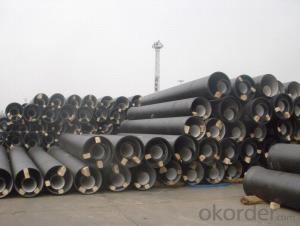Ductile Iron Pipe ISO2531:1998 C30 DN450
- Loading Port:
- China main port
- Payment Terms:
- TT or LC
- Min Order Qty:
- 1000 m.t.
- Supply Capability:
- 50000 m.t./month
OKorder Service Pledge
OKorder Financial Service
You Might Also Like
1.Ductile Iron Pipe Description :
DI pipe fittings are manufactured according to ISO 2531 or BS EN545 or BS4772 FOR POTABLE WATER ,internal is cement lining or wet epoxy coating;External is zinc plus bitumen or wet epoxy coating. We also manufacture ductile iron fittings with fusion bonded epoxy both inside and outside. All the producets are sutible to water pipes fields.
We have passed ISO9001,ISO14001,OHSMS18001 certificate.
2.Main Features of the Ductile Iron Pipe:
•High yield strength
•High tensile Strength
•High corrosion resistance
•Pressure Resistence
•Anti-corrosion
•Installation is convenient
•Satisfy the highest hygienic standards
3.Ductile Iron Pipe Images:
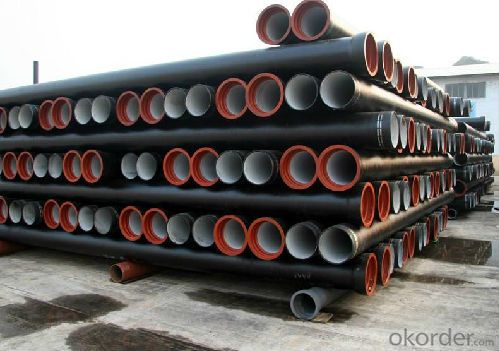
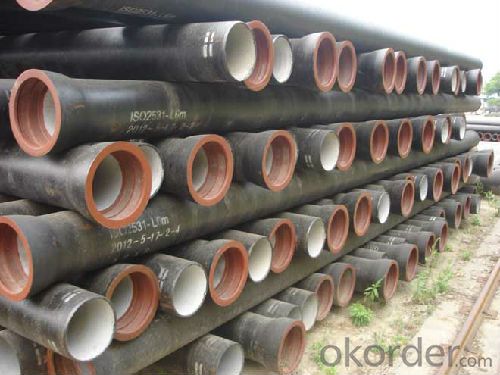
4.Ductile Iron Pipe Specification:
Model Number: DN80-1600
Length: 6M/5.7M/NEGOTIATED
Standard: ISO2531 / EN545
Application: Potable/Sewage Water
Diameter: DN80-1600
Shape: Round
Hardness: 230
Pipe Wall Thickness: standerd
Pull Strength: 420
Yield (≥ MPa): 300
Material: Ductile Iron
water ductile iron pipe: SO2531 / EN545 DI pipe
5.FAQ:
We have organized several common questions for our clients,may help you sincerely:
1.Q: Why would you choose ductile iron pipe rather than other pipe materials?
A:The reasons are obvious for that not only ductile iron pipe possesses the inherent strength and flexibility of ductile
iron, combined with proven corrosion protection systems, but also the cost savings can be achieved from design to
installation and commissioning.
2.Q:Why can you guarantee the inner of pipes can’t be corroded?
A: High alumina cement mortar lining and sulphate-resistant cement mortar lining. These two special linings are applicable
to inner anti-corrosion for sewage pipes, improving resistance to erosion of the sewage components.
- Q: Can ductile iron pipes be used for offshore oil and gas installations?
- Yes, ductile iron pipes can be used for offshore oil and gas installations. Ductile iron is known for its strength, durability, and corrosion resistance, making it suitable for various applications including offshore environments. Additionally, ductile iron pipes are cost-effective and can withstand high pressure and extreme weather conditions, making them a reliable choice for offshore oil and gas installations.
- Q: Are ductile iron pipes suitable for pressure sewer systems?
- Yes, ductile iron pipes are suitable for pressure sewer systems. Ductile iron pipes have excellent strength and durability, making them capable of withstanding high pressure and stress levels. Additionally, they have a smooth interior surface that promotes efficient flow and reduces the risk of clogs. These qualities make ductile iron pipes a reliable choice for pressure sewer systems.
- Q: Are ductile iron pipes more resistant to breaks and cracks than other pipe materials?
- Yes, ductile iron pipes are generally more resistant to breaks and cracks compared to other pipe materials. Their unique composition and manufacturing process make them highly durable and flexible, allowing them to withstand high pressure, heavy loads, and ground movement without breaking or cracking easily.
- Q: Is ductile iron pipe breakable?
- 1 、 the drainage pipe is easy to fold. Folding is formed on the surface of various drainage pipe line, the longitudinal defects often throughout the entire product;2, poor drainage pipe surface prone to scarring;3, inferior drainage pipe, no metallic luster, is pale red or similar to the color of pig iron;4, inferior drainage pipe easily scratch, because the inferior material manufacturers equipment is simple, easy to produce burr, scratches the drainage pipe surface. Deep scrape reduces the strength of the ball drain;
- Q: Can the underground cast iron pipes be connected with clamps to form buttress?
- The clamp hoop is a connecting device for connecting pipe fittings, valves and pipe fittings with grooves. Used in the fast joint between the role of tightening, the general two joints with gaskets, rubber, and silicone, ptfe.
- Q: How are ductile iron pipes protected against external damage?
- Various protective measures are employed to shield ductile iron pipes from external damage. One commonly used method entails applying a protective coating to the pipe's outer surface. This coating acts as a barrier, preventing direct contact between the pipe and corrosive elements in the surrounding environment. Materials like epoxy, polyurethane, or zinc, which exhibit excellent resistance against corrosion, abrasion, and chemical attacks, can be utilized for this purpose. Furthermore, an additional layer of protection can be provided by encasing ductile iron pipes in a concrete or cement mortar lining. This lining not only reduces the likelihood of physical damage caused by external impacts or soil movement but also enhances the pipe's hydraulic performance by minimizing friction and maintaining a smooth flow of fluids. In addition, proper bedding and backfilling techniques are employed during the installation of ductile iron pipes. This involves using appropriate materials such as sand or gravel to support and stabilize the pipe, thereby minimizing the risk of external damage resulting from uneven ground settlement or heavy loads. Compacting the backfill material adequately is vital to ensure the long-term integrity and stability of the pipe. Regular inspection and maintenance are also crucial for safeguarding ductile iron pipes against external damage. Routine inspections can identify any signs of corrosion, coating deterioration, or physical harm, enabling timely repairs or replacement before significant issues arise. Additionally, employing proper cathodic protection systems can counteract electrochemical reactions occurring on the pipe's surface, preventing corrosion by applying an electric current. To summarize, the protection of ductile iron pipes against external damage encompasses the application of protective coatings, concrete or cement mortar linings, appropriate bedding and backfilling techniques, and regular inspections and maintenance. These measures collectively ensure the durability, longevity, and dependable performance of ductile iron pipes in various environments and applications.
- Q: Are ductile iron pipes suitable for use in food processing plants?
- Yes, ductile iron pipes are suitable for use in food processing plants. Ductile iron is highly durable and corrosion-resistant, making it suitable for transporting various fluids in food processing facilities. Additionally, ductile iron pipes are approved for use in potable water systems, further indicating their suitability for food-related applications.
- Q: Is the crankshaft material forged or ductile iron?
- Nodular cast iron, cast iron, forged steel crankshaft are used in the three. There are 3 kinds of axes in our company
- Q: Are ductile iron pipes compatible with other pipe materials?
- Yes, ductile iron pipes are compatible with other pipe materials. They can be connected to pipes made of various materials such as PVC, HDPE, steel, and more, using appropriate fittings and connectors.
- Q: How does ductile iron pipe perform in extreme weather conditions?
- Ductile iron pipe performs exceptionally well in extreme weather conditions. Its superior strength and durability make it resistant to cracking, breaking, or corroding, even in harsh environments. This stability allows it to withstand extreme temperatures, high winds, heavy rain, and even seismic activities, ensuring reliable performance and longevity.
Send your message to us
Ductile Iron Pipe ISO2531:1998 C30 DN450
- Loading Port:
- China main port
- Payment Terms:
- TT or LC
- Min Order Qty:
- 1000 m.t.
- Supply Capability:
- 50000 m.t./month
OKorder Service Pledge
OKorder Financial Service
Similar products
Hot products
Hot Searches
Related keywords
